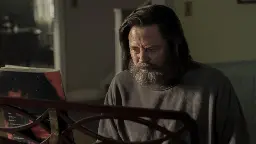Nick Offerman Slams ‘Homophobic Hate’ Against His ‘The Last of Us’ Episode: ‘It’s Not a Gay Story. It’s a Love Story, You A–hole!’
Nick Offerman Slams ‘Homophobic Hate’ Against His ‘The Last of Us’ Episode: ‘It’s Not a Gay Story. It’s a Love Story, You A–hole!’

Nick Offerman Slams ‘Homophobic Hate’ Against His ‘The Last of Us’ Episode: ‘It’s Not a Gay Story. It’s a Love Story, You A–hole!’

